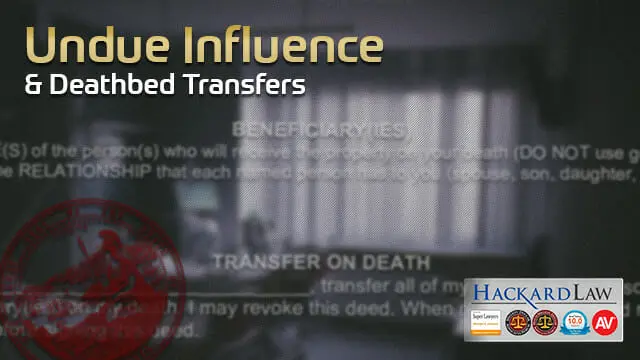
Deathbed Transfers & Undue Influence | CA Trust Attorney
California has incorporated scientific knowledge into statutes defining undue influence and financial exploitation of elders. These legislative efforts culminated back in 2014 with the effective application of the new California Elder Abuse and Dependent Adult Civil Protection Act. These statutes provide a powerful remedy against undue influence, including instances of deathbed transfers.
Undue Influence
Undue influence is defined by California Probate Code Section 15610.70 as “excessive persuasion that causes another person to act or refrain from acting by overcoming that person’s free will and results in inequity.” It includes four elements:
- Vulnerability of the victim
- Apparent authority of the influencer
- Actions or tactics used by the influencer
- Equity of the result
Deathbed Gifts, Wills, Trusts and Deeds
Deathbed transfers may be a beautiful gesture of love and caring – who could argue with that? That said, there are other deathbed transfers spawned not by the love and care of the giver, but rather the wrongdoer’s avarice and greed. It’s this second category of deathbed transfers that can divide families and ultimately stoke the fires of estate lawsuits.
Few would argue that a dying person would not be vulnerable to undue influence. A dying person’s vulnerability is likely marked by “incapacity, illness, disability, injury, age, impaired cognitive function, emotional distress, isolation or dependency.” An early inquiry is whether “the influencer knew or should have known of the alleged victim’s vulnerability.” So a deathbed gift is first analyzed within the context of the decedent’s overall circumstances and next tested by whether the influencer knew or should have known of the victim’s vulnerability.
Oftentimes a person dying is heavily medicated and alternating between consciousness and unconsciousness. But a person who is close to death can also be vulnerable to undue influence without any medication involved. Emotional distress, isolation and all attendant emotions and concerns can move family to rally around their dying loved one. But these factors can create vulnerability to undue influence by wrongdoers.
All influencers have some type of apparent authority. Evidence of this authority may include “status as a fiduciary, family member, care provider, healthcare professional, legal professional, spiritual advisor, expert, or other qualification.” We have seen deathbed undue influence cases involving the coercion of a stepmother, child, or grandchild over a vulnerable elder. Undue influence scenarios seem to predominate in blended families with strained relationships between stepmothers and biological children. This is probably due to the presence of some preexisting frayed family relationships.
Controlling “medication, the victim’s interactions with others, access to information, or sleep” are tools of the undue influencer. Affection, intimidation or coercion are additional methods. The undue influencer will have the victim act to make changes in personal or property rights – often re-writing an estate or trust to their benefit. Such changes are cloaked in secrecy and initiated in haste.
Courts will ultimately look to the “equity of the result.” Considerations include “the economic consequences to the victim, any divergence from the victim’s prior intent or course of conduct or dealing … or the appropriateness of the change in light of the length and nature of the relationship.”
Deathbed transfers commonly diverge from the elder’s prior intent or course of conduct. We have seen several cases where decades of estate planning equally benefitting an elder’s children are derailed shortly before death – derailed to benefit one child over all the others or a later spouse.
People are free to give what they have to whomever they want. But freedom is not the question in undue influence cases. The question is whether a wrongdoer took advantage of the deathbed vulnerability.
Hackard Law represents beneficiaries in estate, trust and elder financial abuse litigation, including cases of undue influence in deathbed transfers. We protect client interests across California, including in Los Angeles, Orange, Santa Clara, San Mateo, Alameda, Contra Costa and Sacramento counties. You can call us today at 916-313-3030. We want to hear your story.

 (916) 775-8542
(916) 775-8542